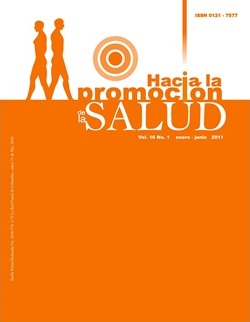Authors
Abstract
Objective: In order to contribute to the accomplishment of law 1384 from 2010, this descriptive research including both, qualitative and quantitative components, was carried out with the general objective of determining, along with the current hospital attention lineaments in Colombia, the agreement between the knowledge related to the most important types of cancer among last year medicine students from the Universities of Manizales. Materials and method: the population for study was constituted by last year students from the Medicine Programs at Universidad de Caldas and Universidad de Manizales and the institutional programs of the academic activities describing the curriculum. Cancer, as a topic of study is scattered in different subjects and educational levels; very few subjects include education in the diagnosis and treatment as an objective, and the inclusion of clinic guides about cancer is not a constant in the subjects' curricula. In spite that some types of cancer are approached in some subjects, this fact was not correlated with a better performance in the knowledge test. The level of knowledge demonstrated in the test was inadequate and there are not meaningful differences in the final grade average obtained in both groups of students. The types of cancer in which there was a better performance coincide because they are dealt with in subjects taken by students by the end of the medical education process. Conclusion: The findings of this investigation allow for the proposal of the creation of a subject dealing with cancer, specifically in everything concerned with prevention and early detection of cancer which must be planned by the end of the educational process of future medical doctors.
Keywords
References
Instituto Nacional de Cancerología. Cáncer en cifras. [En línea]. Bogotá: El Instituto; 2003. [Citado 2010]. Disponible en URL: http://www.cancer.gov.co/contenido/contenido.aspx
Ministerio de la Protección Social (Colombia). Plan Nacional de Salud Pública 2007-2011. Bogotá: El Ministerio; 2007.
Instituto Nacional de Cancerología (Colombia). Modelo para el control del cáncer en Colombia. Bogotá: El Instituto; 2006.
Organización Mundial de la Salud. Prevención de las enfermedades crónicas: una inversión vital. Ginebra: La Organización; 2005.
Examen único nacional de conocimientos de medicina [En línea]. Santiago de Chile: Asociación Chilena de Facultades de Medicina. [Citado 2010]. Disponible en URL: http://www.eunacom.cl/contenidos/muestra.htm
Vallejo J. Re evisión y actualización del marco de referencia y construcción de especificaciones de la prueba de Medicina ICFES–ASCOFAME. Documento preliminar 3. [monografía en línea] Bogotá: ASCOFAME; 2009 [citado 2010]. Disponible en URL:http://www.ascofame.org.co/index.php? option=com_content&task=view&id=114&Itemid=2
Kilfoy BA, Zheng T, Holford TR, Han X, Ward MH, Sjodin A, et al. International patterns and trends in thyroid cancer incidence, 1973-2002. Cancer Causes Control 2009; 20(5):525-31.
Enewold L, Zhu K, Ron E, Marrogi AJ, Stojadinovic A, Peoples GE, et al. Rising thyroid cancer incidence in the United States by demographic and tumor characteristics, 1980-2005. Cancer Epidemiol Biomarkers Prev 2009;18(3): 784-91.
Cordioli MI, Canalli MH, Coral MH. Aumento da incidência do câncer de tireoide em Florianópolis, Brasil: estudo comparativo dos casos diagnosticados nos anos 2000 e 2005. Arq Bras Endocrinol Metab 2009 Jun; 53(4):453-60.
Coeli C, Brito A, Barbosa F, Ribeiro M, Sieiro A, Vaisman M. Incidência e mortalidade por câncer de tireóide no Brasil. Arq Bras Endocrinol Metab 2005 Aug; 49(4):503-9.
Unwin N, Alberti K. Chronic non-communicable diseases. Ann Trop Med Par 2006 100(5-6):455-64.
Instituto Nacional de Cancerología (Colombia). Recomendaciones para la tamización y detección temprana del cáncer de mama en Colombia. Bogotá: El Instituto; 2007.
Instituto Nacional de Cancerología (Colombia). Recomendaciones para la tamización de neoplasias del cuello uterino en mujeres sin antecedente de patología cervical en Colombia. Bogotá: El Instituto; 2007.
Instituto Nacional de Cancerología (Colombia). Recomendaciones para el tratamiento de pacientes con citología reportada con células escamosas atípicas de significado indeterminado –ASCUS- en Colombia. Bogotá: El Instituto; 2007.
Ministerio de Salud (Colombia). Resolución 00412 de febrero 25 de 2000. [citado 2011 Feb 17]. Disponible en URL: http://www.pos.gov.co/documents/archivos/normatividad_regimen_contributivo/ resolucion_412_2000.pdf
Ministerio de la Protección Social (Colombia). Programa de Apoyo a la Reforma de la Salud. Guía para la prevención de la enfermedad crónica y mantenimiento de la salud en el individuo sano mayor de 45 años. Bogotá: El Ministerio; 2007.
Proyecto ISS-ASCOFAME. Guías de práctica clínica basadas en la evidencia [monografía en línea]. Bogotá: ASCOFAME; 2007. [citado 2011 Feb 17]. Disponible en URL: http://www.ascofame.org.co/publicaciones
Asociación Colombiana de Gastroenterología. Primer Consenso Colombiano de Cáncer Gástrico. Rev Col Gastroent 2003 Oct; 18(3 Supl 1):24-7.
Instituto Nacional de Cancerología y Sociedad Colombiana de Hematología y Oncología Clínica. Consenso Colombiano sobre el Tratamiento del Linfoma Folicular no Hodgkin. Rev Col Cancerol 2005; 9(4):149-75.
Ministerio de la Protección Social (Colombia), Pontificia Universidad Javeriana. Guía de atención integral de salud ocupacional basada en la evidencia para cáncer de pulmón relacionado con el trabajo (GATISO-CAP). Bogotá: El Ministerio; 2007.
Congreso de la República de Colombia. Ley 1384 de abril 19 de 2010. por la cual se establecen las acciones para la atención integral del cáncer en Colombia (artículos 5 y 19).


 PDF (Español)
PDF (Español)
 FLIP
FLIP






















